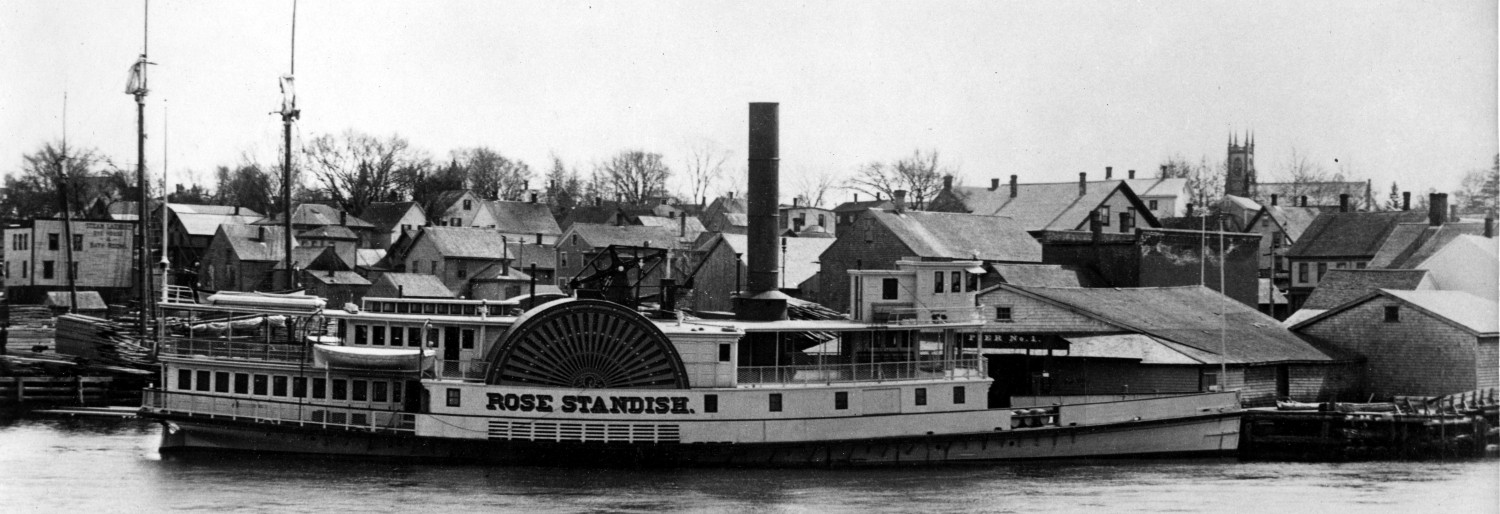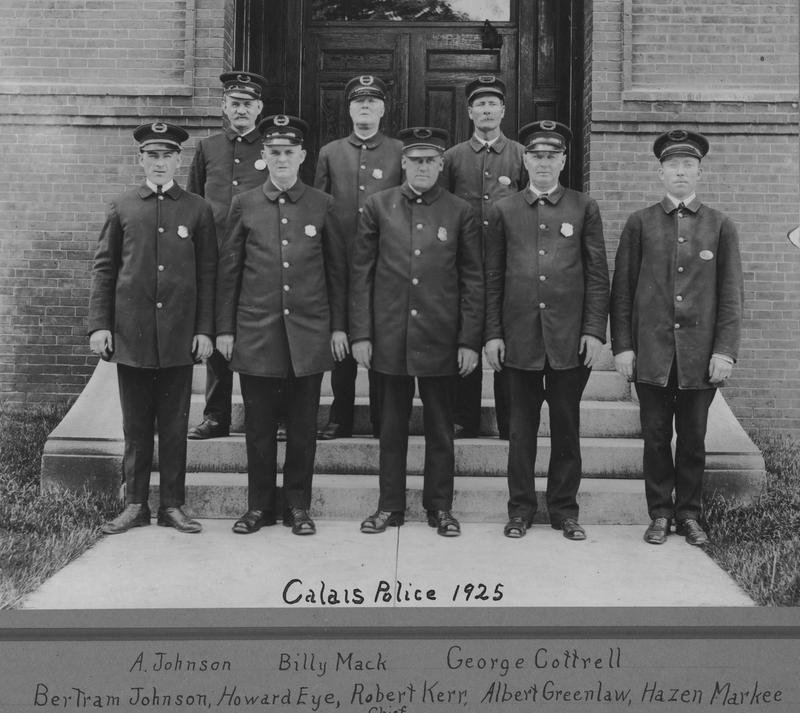
Above is a 1925 photo of the officers of the Calais Police Department.
Sam Saunders, one of Calais’ most eminent and certainly most humorous historians of the era, described these fellows as follows:
“The way I recall, Scout Eye was the regular on the upper beat, Billy Mack was the regular on the lower beat, Ad Johnson was the regular at Milltown, and Bobby Kerr was the longtime Chief of Police. The others were spare or special officers, and George Cottrell was regular in Milltown after Johnson. Bobby Kerr (pronounced Carr, in Mud Lane lingo) was Chief in Calais for a long time. He traded his Street Car Uniform in for the Police Uniform when the street cars went out. Many a Democrat had himself measured for the chief’s uniform before elections, but nobody could upset Bobby.
“When Tom Bridges ran for County Attorney, he decked his car out with new brooms and used the slogan, “A New Broom Sweeps Clean”, and the Democrats countered with, “Honest Tom and Crooked Bob”. Bobby was a favorite with the citizens of Calais. Whenever he got excited, or an emergency arose, his favorite words were, “Geesus, Geesus, Geesus”. He was no Dick Tracy but not many crimes went unsolved during Bobby’s tenure. He had good contacts, and solved many a crime. Bobby didn’t earn big wages, but he was a man who believed in Santa Claus, and thought that Santa came every Saturday night, via the Calais Merchants. He also had the concession of feeding the prisoners, and got free taxi service, so he made out pretty well and if he needed anything, he would spread the word, and usually someone would come up with it.
“One morning while Bobby was feeding his prisoners, there happened to be a young lady in one of the cells, that had been detained overnight, and she said, ‘Bobby, I would like to have some Kotex.’ Bobby replied, ‘You’ll have cornflakes, just like all the rest.’
“We didn’t have dispatchers in those days, but the city had a very unique system. They had blue lights in strategic places, and when a call came into the fire station, they would snap on the lights, and an officer on the street would get to a phone, learn the cause of alarm, stop the first car along, and get to the scene of the crime pronto. It worked very well, and it was a hell of a lot cheaper than today.
“Scout, Billy and Ad worked the night shift, and Bobby kept law and order during the day. On Saturday night Bobby worked and maybe a special or two. One would direct traffic at the Bank corner, while the others patrolled the Main Street. Cars would be going steady up North Street, across Lowell, down Monroe and down Main, looking for a chance to park in front of the chain stores. The smell of hot dogs and onions and of Louie’s peanuts filled the air, and Frank Beckett Sr. was busy weighing out candy and breaking the Honey Sticks in two to give you honest measure. And during all this, these trusted officers were maintaining peace in the St. Croix Valley.
“I think the funniest thing I can remember about Bobby Kerr was away back one busy Saturday forenoon. I was working at the Border Transportation Co., on lower North Street, where busses came in from Eastport, Woodland and Princeton. This was also Bobby’s regular hangout, and this morning he and I were looking out the big window and shooting the bull, and this lady came in and used the restroom. When she came out, our backs were to her, and when she got out the door, we could see that in her haste, somehow, she had tucked the back of her dress inside of her bloomers. When Bobby saw what had happened, he got all excited and shouted, “Geesus, Geesus, Geesus, Stop her, Stop her!”, and at the same time went out the door, hollering, “Mrs.! Mrs.! Mrs.!” Well, by the time he overtook her, they were in the middle of the intersection of North and Main and Bobby was talking to her, and at the same time trying to assist her and she was backing around and around in a circle, the traffic was held up, and some wise guy was laying on his horn, and by the time Bobby got her garments and the traffic straightened out, he was so flustered that he came back and bawled the hell out of me for letting it happen.” — Sammy Saunders
Why the City needed such a large force of officers a hundred years ago we cannot say, although Calais at the time was more than twice as populous as it is today and was a commercial center for this end of Washington County and parts of New Brunswick. On weekends especially it was crowded with folks from the outlying towns, New Brunswickers, and locals although they were generally a well-behaved lot. Chief Bobby Kerr’s annual report for 1948 is reasonably representative of a year of crime in Calais during the first half of the 20th century.
A total of 156 arrests including 128 for intoxication were made during 1948 by officers of the Calais police department according to the annual report of activities of the department released today by Chief Robert Kerr In addition to the intoxication cases there were arrests made for the following reasons; Drinking in public, two; larceny, four; reckless driving, one; non-support, one; assault, three; incest, one; robbery, one; indecent exposure, one; breaking entering and larceny, one; operating under the influence, five; leaving the scene of an accident, two; no operator’s license, two; search warrant, one; inadequate brakes, one; larceny from a person, one; neglect of children. one. The report also stated that four persons were committed to the State Hospital during the year.
MARCH REPORT—In another report prepared and released by Kerr it was stated that officers of the department made 11 arrests during the month of March: 10 for intoxication and one involving operation of a vehicle under the influence. Five of those arrested on warrants charging intoxication were found guilty and paid fines of $5 and costs while the person charged with operating under the influence pleaded not guilty and appealed. The report stated fines levied by the department for traffic violations during the past month amounted to $7.
Public intoxication was a crime in those days and accounted for all but 20 of the arrests made by the Department in 1948. This is not to say there was no crime. Prohibition was in effect until the thirties and the local gin joints were busted occasionally—but on a rotating basis to spread the cost fairly. Most crime, at least as reported in the newspapers from 1900 – 1950, seldom involved violence.
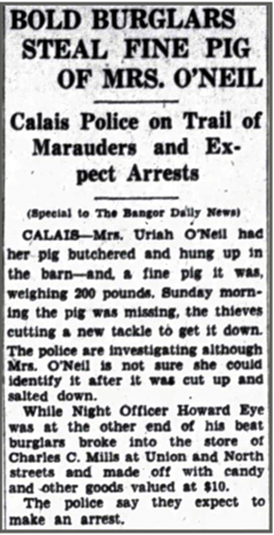
The 1933 theft of Mrs. O’Neil’s pig was pretty standard fare back in those days, and the police would certainly have made every effort to find the critter in whatever shape it was then in. To the credit of the police almost all crimes were eventually solved. In one notable instance Chief Bobby Kerr pursued a band of “gypsies” all the way to Bangor to retrieve less than $100 lost by some locals in a rigged game of chance.
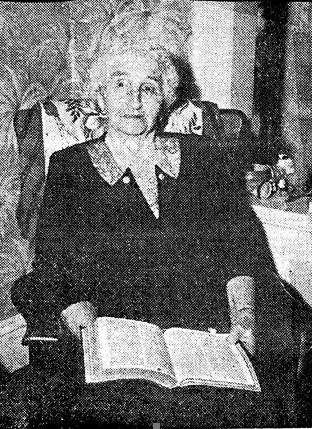
ADDIE O’NEIL – 1959
Addie O’Neil, the widow of Uriah O’Neil, was a fine and popular lady who lived at 17 Chandler Street. In 1959, at 93 years of age, she and Frank Beckett were feted at the 150th Calais anniversary as two of Calais’ most respected and beloved citizens. It is very likely the thieves had reason to regret they stole this particular pig.
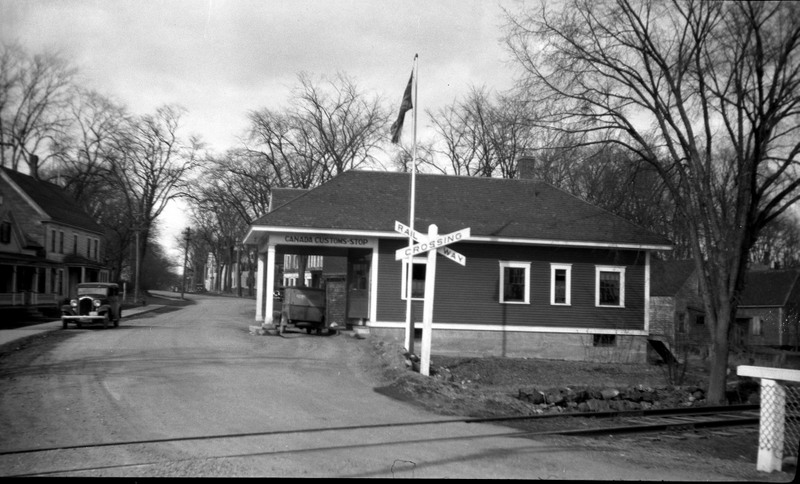
MILLTOWN, NEW BRUNSWICK CUSTOMS
One rather unique crime problem Calais has had throughout the years was desperadoes on the run from U.S. authorities and fetching up on the border with the intention of bolting to Canada if things got too hot. Milltown, New Brunswick customs was a logical entry point for these folks as Milltown, Maine was generally regarded, fairly or unfairly, as a good place to go to ground. Consider the case of John Porter as reported in The Boston Globe in 1906:
CALAIS, Me, Dec 1
Capt. P.J. Hurley of the Cambridge police force left on the 7 o’clock train this morning for Boston with John T. Porter, who was arrested in Milltown Wednesday night by local officers. Porter was securely manacled, and a big and curious crowd was on hand to see his departure. “I consider this man a more desperate and dangerous criminal than the negro Francis who has been giving the Maine officers such a chase. It was a good piece of work in landing him, and if he had not been taken off his guard someone would have been hurt, for he would have shot to kill. He served 11 years for robbing a house in Brighton and nearly beating to death an old woman who came in his way. Last August he and his pal Tracey were caught in a house in Cambridge, and while Tracey and a policeman were in a clinch Porter fired five shots at the two of them, wounding his pal in the forehead. He’s a bad man and I shall take no chances with him, Deputy Sheriff Woodman said today; in nearly every case Porter was seen in the vicinity, but we never suspected him, we even asked him if he had seen any suspicious characters around. He always told us that he hoped we would catch the villains. He was a rather good appearing fellow and we thought he was all right.”
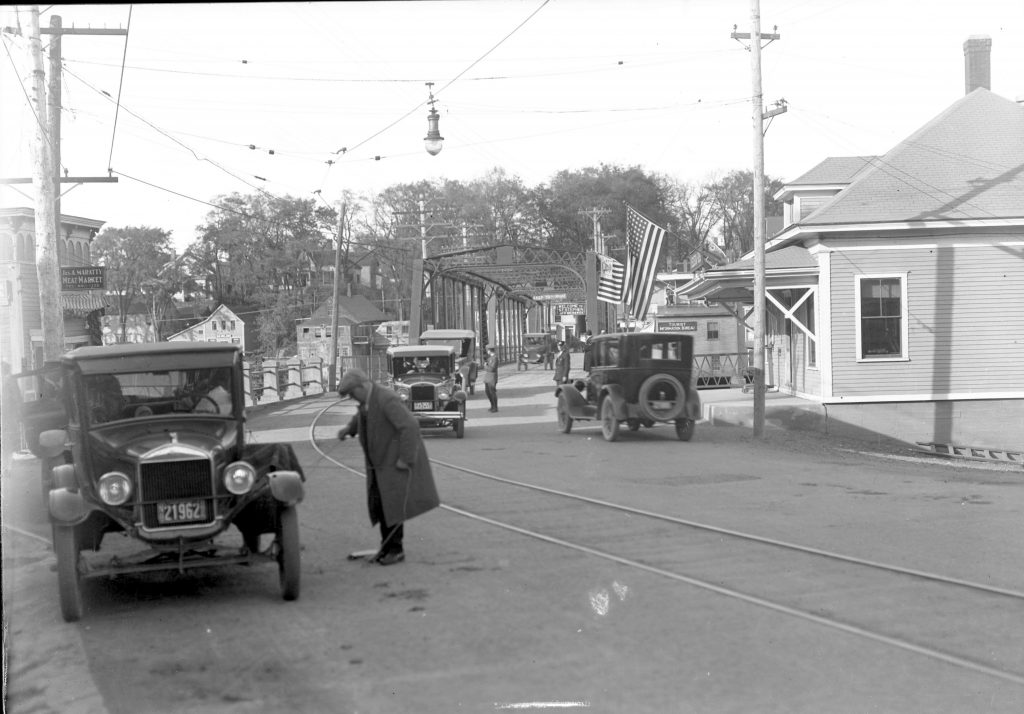
And then of course there was smuggling done on an industrial scale by the lumber barons and the bootleggers and on a small but regular basis by everyone else in the St. Croix Valley. The Ferry Point Bridge was the scene of much of that activity. In the early days the Calais Customs House was to the right approaching the bridge and smugglers usually didn’t encounter much difficulty unless of course you were a first-time bean smuggler. The inspectors apparently had special training in spotting “beaners.”
BEAN SMUGGLING HAS ITS DRAWBACKS (special to The Bangor Dally News)
CALAIS, Feb. 16, 1932 —
Hip rubber boots are a common sight along the coast of Maine and especially along the St. Croix River and Passamaquoddy Bay, and it is no uncommon light to see a man scuffling along in this unwieldy footgear; but one fellow thus dressed as he approached the customs force on the American side of the international border line seemed to be having difficulty in making progress; though apparently sober he seemed to be in great distress. When asked by the officer if he had anything to declare he shook his head, but the officer, not convinced, asked what he had in the boots. “Not much,” he replied. “Well I guess you better come inside,” the officer said. “Wait, wait,” the fellow said. “I’ve got some beans.” Beans?” the officer asked. “Yes, beans, they were selling nice yellow eye beans over there for 50 cents a peck, and I couldn’t resist buying a dollar’s worth. I put a peck in each boot but the bags burst and they worked down under my feet and liked to killed me when I trod on ’em. I’m willing to pay, mister, and I guess hereafter I’ll buy my beans nearer home.”
A year after the incident above Officers Howard Eye and Frank Billings came to the rescue of a St. Stephen officer in an instance of international cooperation common on the border in those days.
CALAIS POLICE CROSS ONE TO QUELL AFFRAY
St. Stephen Officer Set Upon and Badly Beaten Up (special to The Bangor Daily News)
CALAIS — Officer Ernest Woodward of St. Stephen was set upon early Sunday morning by three men and a woman and was badly beaten up and but for timely assistance from Calais police might have fared much worse if not been killed. Woodward started to arrest Dyke Maxwell a taxi driver for making a disturbance earlier in the night finding him at the St. Stephen boat landing. Maxwell put up a fight assisted by two sailors from a lighter in the stream and a young woman with them who assisted by beating Woodward over his head with his flashlight. Woodward was getting much the worst of it when he managed to reach his whistle and blew loudly This blast was heard by Night Officer Howard Eye of Calais who picked up Traffic Officer Frank Billing and he rushed in a car across the river just about in time. At the approach of the officers the sailors dropped into a boat and rowed out to the lighter. Maxwell and the woman ran. The two sailors and the woman were arrested but Maxwell is still at large with the CMP after him. The case will come before Magistrate Veasey in St. Stephen Monday morning.
One of the advantages the Calais Police had in those early days and one which generally persists to the present day is the remarkable incompetence of local miscreants. A classic example are the two incompetents who burgled Harry Huntington’s home on Monroe Street in 1933:
CALAIS THIEF’S ODD MISTAKE – Bangor Daily News March 14, 1933
Picks Jail as Lodgers Sleep with Pockets Full of Loot CALAIS March 13— The Calais police have established such a perfect record for apprehending criminals and securing convictions that violators of the law in this city apparently think it the better course to give themselves up rather than stand the suspense of awaiting the arrival of officers which event they regard as inevitable. Herbert Huntington of Monroe Street, with his family who had been spending Friday in Lubec, arrived home by car near midnight and as he entered his yard saw a light in the kitchen of his home and immediately two men ran from the rear door. Rushing into the house he found the place on fire but succeeded in extinguishing the blaze before much damage was done. Looking about, he discovered a valuable electric clock was missing and an open drawer in the sideboard revealed that a package of valuable silver spoons, a recent anniversary gift, had also been taken. Jumping in his car he started for the police station and when passing Washington Street, he saw a man resembling one of the marauders. Much excited, Huntington jumped from his car and grabbed the much-surprised fellow by the throat demanding to know what he meant by entering his house and setting it afire. The culprit, who was a bit under the weather, insisted he knew nothing about it, that he hadn’t been in the vicinity of Monroe street for six weeks. Half-convinced Huntington let him go and continued on to the police station; and later accompanied by Night Officer Howard Eye returned to the Huntington residence where a careful checkup revealed nothing further missing. Later, in making his rounds, Officer Eye called at the jail and discovered a man sleeping near the furnace. After being shaken vigorously the fellow struggled to his knees and there was a cascade of silver spoons from one of his pockets. Officers Eye immediately unlocked the door of a nearby cell and ushered the welcome guest in. Saturday morning City Marshal Kerr located the prisoner’s companion and the loot and they were brought before Judge George Downes of the Calais municipal court.
And then there was Ralph Mitchell of Milltown, who in December of 1932, broke into a Milltown warehouse and stole a large quantity of cigarettes and tobacco; he unwisely sold some of the cigarettes to the Customs Officer on duty at Milltown Customs—after which he proceeded to make some even more serious blunders:
Milltown Man’s Alibi When Caught with Stolen Goods (special to The Bangor Dally News)
CALAIS Dec 4 — Ralph Mitchell of Milltown was held to $1000 bonds for his appearance Monday at a continuance of the case before Judge George Downes in the municipal court. Mitchell was arrested by City Marshal Robert E Kerr charged with entering the warehouse of Milliken-Tomlinson at Milltown on the night of Nov 30th and removing cigarettes and tobacco to the value of $381. The break was discovered by Edward Gayton when he opened the warehouse Wednesday morning. Entrance had been gained through a cellar window and the cellar doors opened from the inside and a checkup of the merchandise resulted in the discovery that nothing but cigarettes and tobacco had been molested. Mitchell was suspected when it was discovered he had attempted to sell several cartons of cigarettes to Immigration Officer Albert Nichols who was on duty at the Milltown bridge. Mitchell and Alton Buzzell also of Milltown, Me and at whose house Mitchell stayed Wednesday night went to Milltown N.B. and endeavored to dispose of the loot. It was claimed they were suspected of smuggling by Canadian Customs Officer McConvey who, after they had made a sale to William Daigle, seized the cigarettes and reported the matter to Officer Kerr. Mitchell on one of his trips across the bridge to Maine was searched by Officer Nichols who found several cartons of cigarettes concealed on his person. Mitchell when asked by Judge Downes what he had to say for himself claimed he had been drinking and that when he awoke from a nap in the “Alward Pasture” he found a bag containing the stuff and had no idea where it came from. He could not remember whether he had been at Buzzell’s house or of any of the transactions related by the witnesses. When asked by the judge if he had ever been troubled with amnesia, he replied that he did not know what that was but anyone who took a couple of drinks of that Canadian alcohol might have anything.
We note for you Milltown folks the name of owner of the house at which Mitchell was staying—that of Alton Buzzell. We believe this was the house which was on the steep slope near Bridge Street and for years leaned at a sharp angle toward the river until one fine day the house simply tumbled down the bank toward the railroad tracks. As late as the 1960s the house had a “reputation.”
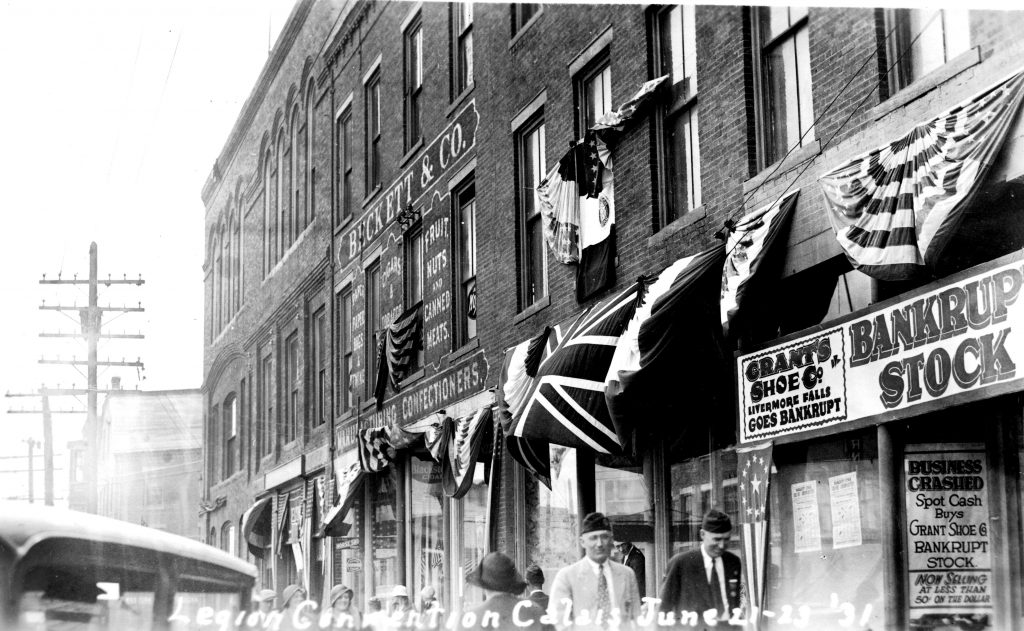
MAIN STREET, BECKETT STORE in 1931
You may have noticed that many of the incidents related above occurred during the 1930s when Calais was in the depths of the Depression. The above photo shows the Grant’s Shoe Store in Calais in 1931, one of many local businesses conducting a bankruptcy sale in those years. During the Depression desperate young men often went on sprees of robbery, burglary and general mayhem such as the three boys from Rhode Island who were apprehended after a wild chase in Charlotte in 1932.
WILD AUTO CHASE OF BURGLARS ON DOWN-EAST ROAD
Trio Hit Up [to] 75 An Hour But Were Caught By Nervy Officers
IN CALAIS COURT
Providence Men Wanted for Several Eastern Maine Breaks (special to The Bangor Daily News) CALAIS Aug 15
After a wild ride of eight miles traveling at 75 miles per hour over a narrow dirt road in a cloud of dust, officers today arrested Joseph Mosea, 33, Albert Conca, 17, and Anthony Andito, 21, of Providence wanted for a series of breaks through the eastern part of the state. City Marshal Robert Kerr learned this morning that the Washington street A & P store had been entered during the night, and in company with Harvey P Smith [he] investigated. They found that entrance had been made by breaking a glass in the door and that a large quantity of cigarettes candy and cash had been taken A check-up of all suspicious parties was made and after one of the finest pieces of detective work ever done here Marshal Kerr and Deputy Sheriff Smith started a search for a Rhode Island car. They notified United States Customs Patrolmen Walter E McKay and Ralph B Pope to be on the lookout for the car and started toward Robbinston on Route 1. They had proceeded but less than a mile when they saw the wanted car approaching, but owing to traffic could not intercept them. Recognizing the officers, the driver of the Rhode Island car turned sharply up South street and the chase was on; driving at top speed they gradually pulled away from the car occupied by Marshal Kerr and Deputy Smith who, fearing they would lose their quarry, signaled the customs patrolmen to take up the chase through Milltown and over the Woodland road and on to the Charlotte road. The race continued in a cloud of dust and never at less than seventy miles per hour until forced in the ditch near Young’s pit. The men surrendered and were taken into custody by the marshal and DeputySheriff Smith.
The car contained most of the stolen goods: sixty cartons of cigarettes, eight one-pound boxes of candy, jam and cake, all valued at about $100.
One of the trio admitted to the break and showed a badly lacerated hand suffered when he broke the glass in the door. Breaks have been made in Machias and at the Atlantic and Pacific store in Milbridge, and it is evident that this is the gang that has committed the theft. Much credit is due to Marshal Kerr and Deputy Sheriff Smith for the clever way in which they handled the case and Patrolmen McKay and Pope for their courage in making the drive they did and facing the three men that were supposed to be armed. It is thought that sometime during their flight they disposed of their guns as none were found when they were arrested. Their car was a new Ford sedan bearing Rhode Island license number 81891. The prisoners were arraigned before Recorder Ernest A. Woodman Monday afternoon, and Anthony Audito pleaded guilty, the others pleading not guilty. They were held in $1000 bail for their appearance at the October court.
The A & P on Washington Street was in the building between Layafette Street and Germain, recently owned by Billy Howard. It was directly across from what many will remember as Hayman’s Filling Station, later Chick’s Store. The two who did not plead guilty changed their plea at the next term of Superior Court. In a sign of the times the younger boy, when asked by the judge what he thought an appropriate jail term might be, responded it made no difference to him—he had no job or place to live.
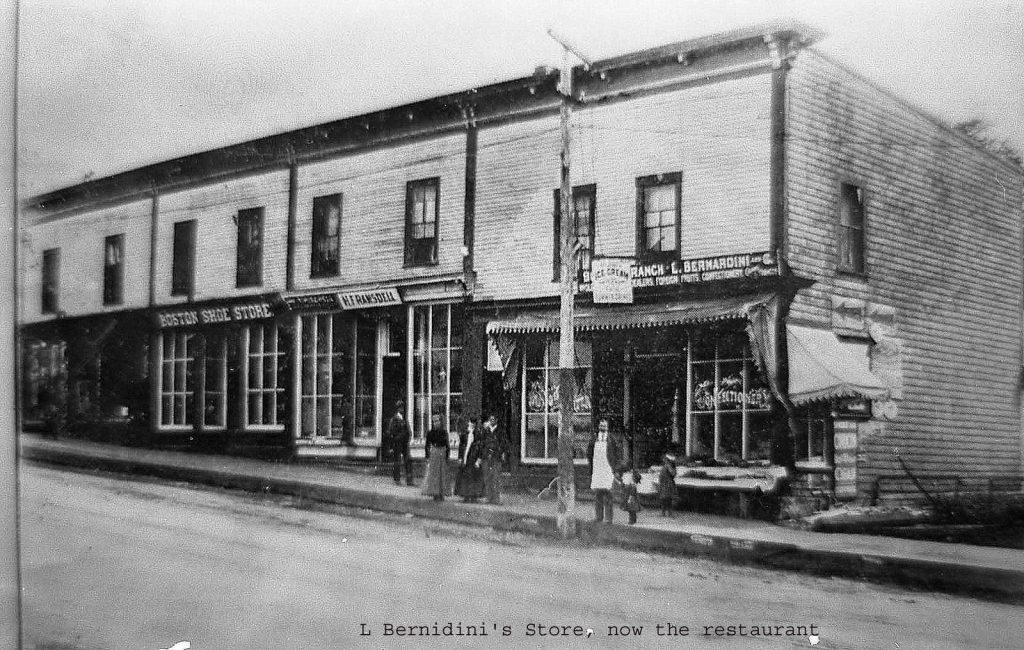
There was, of course, some serious crime in the valley in the 1900s, such as the shooting that occurred at Luigi Bernardini’s bar in 1932. It is seen above as the fruit store–which it was for many years until Luigi turned it into a bar after the repeal of Prohibition. It is now Crumbs. We’ll leave you with an account of that incident which was published in the Historical Society newsletter some years ago:
You may not be aware that national prohibition and the temperance movement got its start in 1815 in Portland, Maine with the formation of the “Total Abstinence Society” which promoted and managed to convince the Maine legislature to pass the first state law banning the manufacture and sale of liquor in 1851. In 1934, the 21st amendment repealed prohibition and Calais was not long making up for a century of thirst. Beer halls flourished (liquor was still prohibited in Calais in 1936) including one owned by Luigi Bernardini on Main Street. On November 4, 1936 Leo Skidds, a local boy chiefly known for stealing cars, slid into a booth at Bernadini’s and put two pints of whiskey, still illegal in Maine, on the table. It was not the first whiskey Leo had been friendly with that day. Waiter Roy Moffitt hustled the drunken, angry Skidds and his whiskey out the back door. Sadly, Skidds was still sober enough to find his way back to the front door, and, pushing aside Mrs. Bernardini who had attempted to block his entrance, resumed his place in the booth. The proprietor, Louis Bernardini approached Skidds and was told “Keep away from me, Louis, if you don’t want a bullet,’’ and all may have been well had not Roy Moffitt chosen this moment to walk by the table. Skidds, still bearing a grudge against Moffitt, came up shooting. His revolver misfired twice before patron William Tracy managed to hit Skidd’s gun hand just as the third shot was fired striking Moffitt in the groin, passing through his body and out his back. Moffitt was operated on by Dr. Miner and lived; and the authorities carted Skidds off to the county jail in Machias where, not surprisingly, no one would go his bail on the attempted murder charge. You can be sure the temperance folks were saying, “I told you so.”
